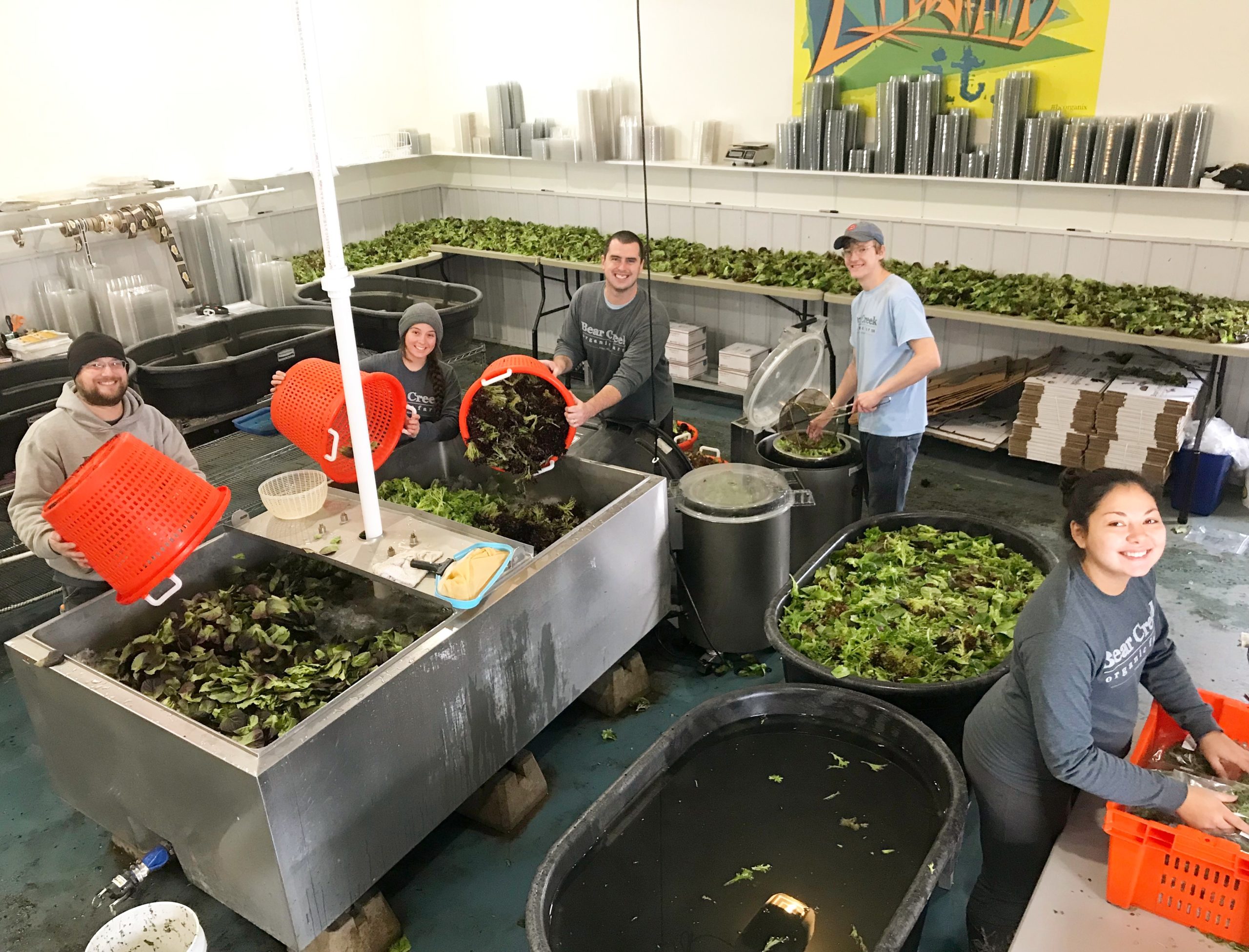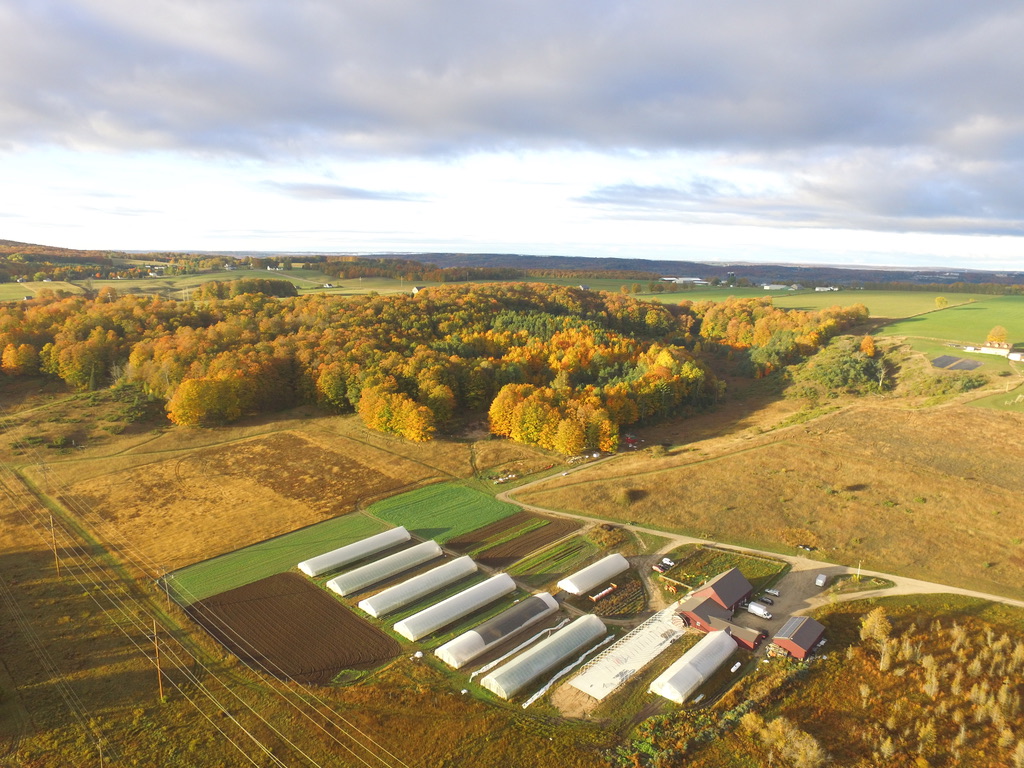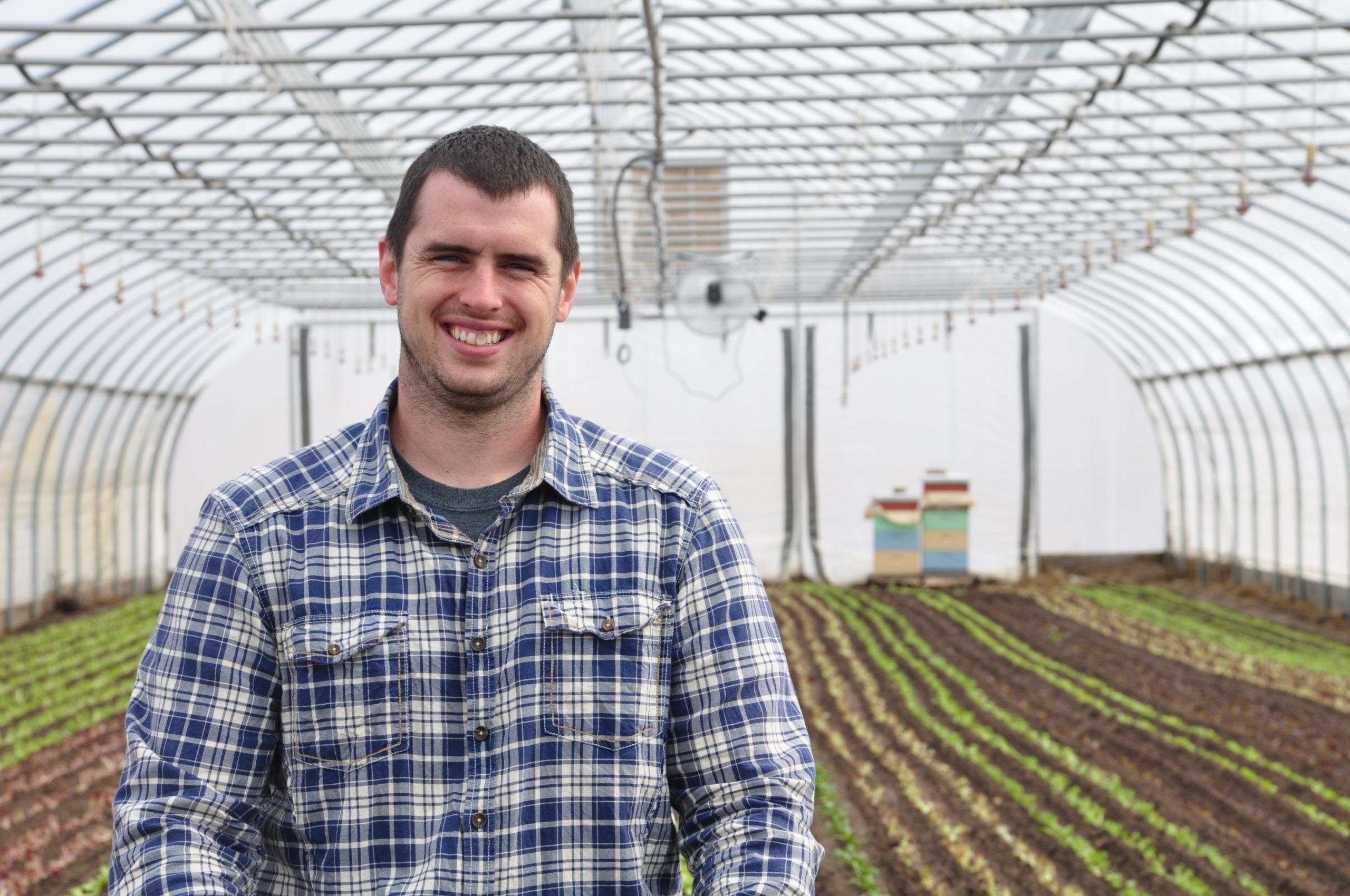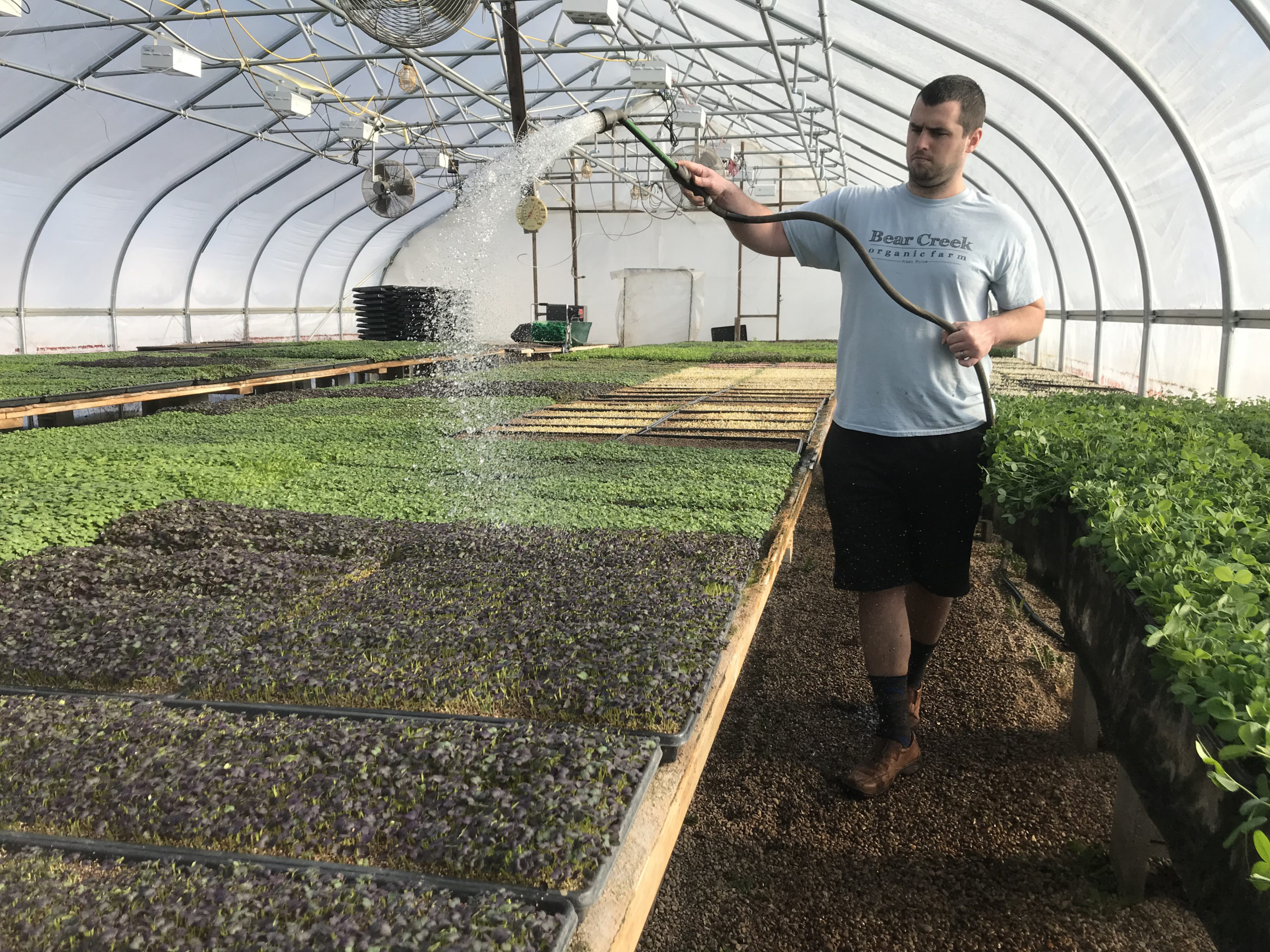
Feb 29, 2020
Michigan startup farm’s success driven by conviction, community
Brian Bates’ faith and enthusiasm for organic produce are strong.
Seven years ago, he and his wife, Anne Morningstar, bought 75 acres near Petoskey in Northern Michigan with the belief that the region would be resilient in dealing with climate change. He is a native of Virginia, while she is from Indiana.
“We studied this in school and knew we needed to be in the northern U.S. and near abundant freshwater,” said Bates. They spent 2013 building a pole barn that is both their home as well as their farm’s wash/pack facility. Newly established Bear Creek Organic Farm’s first sales of vegetables started in 2014 at $26,000.
Fast forward five years to 2019 when the farm sold $515,000 in fresh sales, according to sales figures Bates shared in a talk at the Great Lakes Fruit, Vegetable & Farm Market EXPO in Grand Rapids in December.
“We still live in that pole barn home and have since added three more barns and nine greenhouses to expand the farm’s production capacity,” he said. Bates said they originally didn’t plan to grow so much, but they’ve been surprised by the demand.
“It’s driven by our customers, not because we wanted it, or because we thought it would be a good idea,” he said. “We wouldn’t be expanding if we weren’t selling our stuff, and we wouldn’t be selling our stuff if our customers weren’t telling us what to grow.”

Making market
 Bates said the local community has welcomed them. His energy and enthusiasm comes not only from sales but in marketing the farm operation.
Bates said the local community has welcomed them. His energy and enthusiasm comes not only from sales but in marketing the farm operation.
Eighty-five percent of Bear Creek’s produce was sold within 12 miles of the farm. About 45% of the farm’s 2019 sales were direct, while 55% were wholesale through grocery stores in Petoskey.
“We primarily focus on social media, both Facebook and Instagram on a daily basis,” Bates said. “Typically, 360 posts per year.” One memorable post involved arranging a surplus of tomatoes into an outline of Michigan. They have an impressive social media following – more than 17,000 followers on Instagram – but they only do that in addition to other marketing efforts around the year.
The farm grows and sells produce year-round, and Bates continues to try to grow his winter operations through propane-heated greenhouses and grow lights. An annual spring plant sale puts the company in the black each year. Bear Creek Organic Farm also holds many events throughout the year.
“We host monthly farm tours, annual plant sale, farm dinners, and now we have a holiday open house that just welcomed 500 people on a snowy night in December,” he said.
Branding is important. Half of the lettuce containers have Bates’ face on it; the other has Morningstar’s (Bates claims the packages with his wife’s face sell better). They’ve started to include their son, Griffin, in social media, but with the idea that they’re only sharing a little of their home life, not using him to sell produce.
Organic certification, too, is a vital part of the farm’s brand. Bates thinks it matches the values of the region, which is known for its stunning landscapes and has been included in the state’s Pure Michigan marketing campaign.
“It seems logical and people almost expect it,” Bates said of organic certification. “The biggest difference in our region is probably that we don’t have any major supernaturals (the large-scale natural grocery chains) while we do have a strong co-op and independent grocer population. This makes for better opportunities for a small-scale wholesale grower like ourselves to find market channels locally.”
The Petoskey area has warmed to the out-of-town couple.
“Bear Creek has made their produce available no matter how you choose to purchase groceries,” said Emily Stuchell, who works at the Petoskey Regional Chamber of Commerce in addition to managing the town’s farm market. “You can find them at the co-op, grocery store and of course at the Farmers Market. They also have opened up their farm for plant sales so people can see where the food we eat is coming from. People always like to see the process and Bear Creek has done a wonderful job letting everyone see how they grow our food.”
Stuchell said they’re an example of how to succeed in a small community.
“Brian and Anne are involved in the community and take the time to share their knowledge and they also listen as business owners,” she said. “I believe they share hope for our area, hope for other small businesses and also the success of our community as a whole. They embrace conscious business practices and truly care for their employees and the environment both locally and globally. They show what a Thriving Petoskey looks like.”

Photos: Bear Creek Organic Farm
Growing better
About one-third of their 75 acres are tillable, and Bates said they use only about three – the greenhouses amount to about one acre all together and they also seasonally till two acres of densely planted vegetables.
He’s heavily consolidated the number of crops they grow, focusing on their greatest hits rather than more exotic offerings. Bear Creek Organic Farm specializes in salad greens, microgreens, tomatoes, garlic, living herbs and spring transplants.
During the Great Lakes Expo talk, Bates got passionate about this aspect of growing.
“How many people here grow kohlrabi?” he asked. “We’ll talk afterward, have an intervention. If you grow kohlrabi, (you know) it’s not a popular seller. If it is, then good for you. But something like spinach, spring mix, tomatoes – if you grew fruit, strawberries, blueberries, cherries – they’re going to sell many times more than kohlrabi, and that’s just a given.”
Items they sell wholesale have barcodes, and the software they have used for sales in the markets tracks the most popular sellers.
“It might be five kohlrabi, but it’s a disproportionate victory in our mind, our psyche. Because we know it’s not popular, selling five seems significant, even though while you were selling those five kohlrabies you sold 100 packages of tomatoes; you sold 200 packages of strawberries. Your rate of sale on those other items is so stark.”
Running out of a bestseller while continuing to bring other, quirkier items to market isn’t a victory, he said.
“Don’t celebrate that you ran out of spring mix,” Bates said.
He takes planning and decision-making seriously. He and his team are “seeding and selling every week,” but they try to stay well ahead of demands. He and four full-time employees work full-time, year-round while an additional five employees work seasonally (Morningstar now works outside the farm). All the employees are local.
“Our busiest months of the year are May and August and we try to make sure we always have the product we need when we need it,” Bates said. “We work hard to keep great records and make consistent plans for the year ahead.”
He consistently surveys customers about their preferences and involves his year-round employees in the planning process.
“Typically, we find problems we want to solve and look for solutions,” he said. “That may sound obvious, but we find that a lot of businesses find really shiny and exciting solutions that are looking for a problem to solve. We focus hard on doing a full Lean audit of our operation each year and allow the bottlenecks and inefficiencies that come out of that process to inform any (capital expenditures) in the following months and year. It’s a team effort and involves feedback and research from all members of our year-round staff.”

Natural selection
Starting organic was a natural choice for Bates and Morningstar as well.
“On a philosophical level, it’s what we believe and what we’re comfortable eating,” he said. “For more than 99% of human history, organic was the only type of farming. On a business level, we knew it was one of the few ways we could legally and verifiably distinguish our product on the marketplace. We also knew our area cared about it, but there were no certified organic vegetable farms in our community, and we wanted to help start that movement locally.”
Knowing they wanted to start organic, they were able to select land that had already been fallow for 30 years.
“It’s so important. It’s such a part of who we are, sometimes we take it for granted and forget that most farms are not this way. But our customers remind us each year that it’s why they seek us out. We do an annual customer survey and for five years straight and over 1,000 responses later, the top three favorite things about our farm are that we’re 1) organic, 2) local, and 3) young/enthusiastic.”






